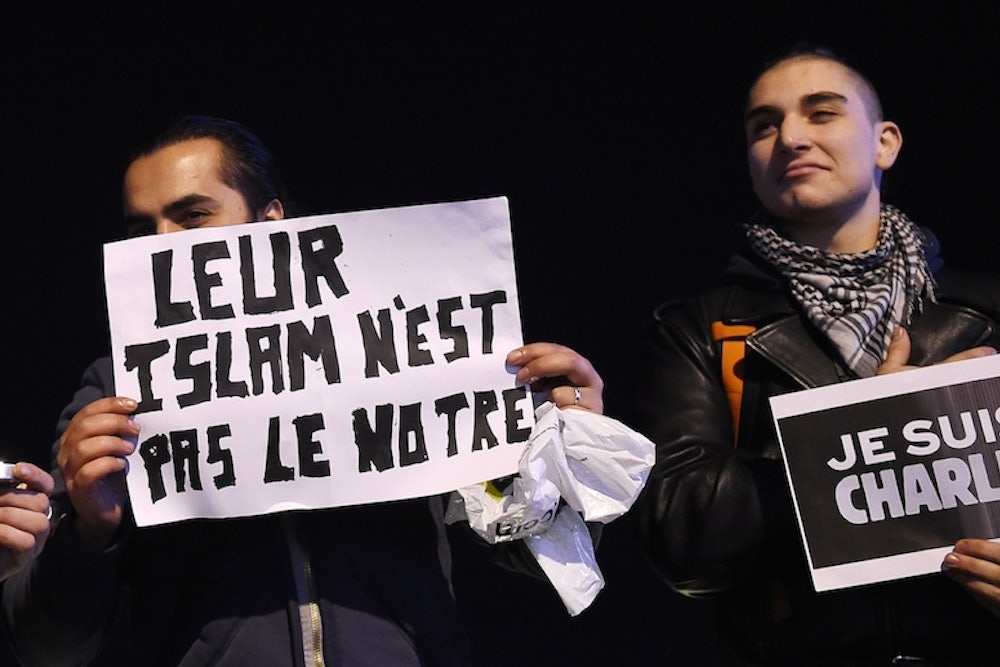There is no sense to be made of senselessness. On the question of a cowardly but carefully orchestrated slaughter of twelve journalists, cartoonists, and editors at the offices of the satirical French magazine Charlie Hebdo—surely the most severe act of terrorism Europe has seen in a decade—respectful silence and solidarity seem an appropriate initial response.
Today’s attack on Charlie Hebdo, however, is also the latest and most gruesome chapter in the disquieting narrative of brutal assault against freedom of speech by religious extremists within Europe.
Of course, we do not yet know the identities of the perpetrators, but we do know, according to video footage, that they chanted “Allahu Akbar!” in the streets and that, according to L’Humanité, at least one of the gunmen told an eyewitness that the group was affiliated with a branch of al-Qaeda. We also know that this week’s issue of Charlie Hebdo features a cover depicting the farcical, camera-crazed novelist Michel Houellebecq, whose latest provocation, Soumission—a novel that imagines a Muslim takeover of la France profonde—appears on French bookshelves today. There may not be a causal link, but it also may not be a coincidence.
In any case, these violent attacks are becoming a chilling fixture in contemporary European culture and in the annals of the continent’s Fourth Estate. In 2004, the Dutch filmmaker Theo van Gogh was murdered in Amsterdam by Mohammad Bouyeri, a Dutch-Moroccan Muslim, after van Gogh produced the film Submission with the activist Ayan Hirsi Ali—a project that heavily criticized the subjugation of women in certain sects of Islam. In 2005, the publication of a series of cartoons depicting the prophet Mohammad by the Danish newspaper Jyllands-Posten led to violent protests, ultimately claiming more than 200 deaths in various attacks against churches, diplomatic missions, and international schools throughout the Muslim world. Charlie Hebdo was firebombed in 2011 for an issue dubbed “Charia Hebdo,” which was “guest-edited” by the Prophet Muhammad. This 2011 attack on Charlie Hebdo brought similar censorship to France, currently home to the largest Muslim population in Europe and, in many ways, a microcosm of the deeper and volatile cultural tensions at stake in many of these attacks.
But at the same time that we view this disquieting pattern of murder and its consequences on free speech, it is just as imperative that we consider these incidents—especially the violence at Charlie Hebdo—as the actions of a deranged and troubled few, rather than the collective will of many. One of the great social challenges in French society today, home to more than 5 million Muslims, is the question of integrating the former victims of French imperial aggression. For the most part, this is a challenge the French government has handled poorly, even shamefully: The majority of France’s Muslims are socially marginalized, confined to ghetto-like “banlieues” that are a million figurative miles from the nation’s majestic cities and entirely alienated by certain applications of laïcité that deny them the right to express their religious identities in public. Frustration with this social exclusion has fueled riots in recent years that have caused many elites to question whether French Muslims are “at war” with the French state. We must not assume in any way that the attack on Charlie Hebdo is evidence for or a confirmation of such a spurious and dangerous myth.
An additional dimension to this tragedy is that it plays directly into the hands of those public figures and politicians who would like to see France regress into an organic national community of blood ties, rather than of citizens. The Islamic extremists who executed the attack on Charlie Hebdo may have murdered journalists and artists, but surely their crime is also against other Muslims in France, who are now likely to be viewed as enemy aliens hostile to the essence of the Republic itself, regardless of their own beliefs. Michel Houellebecq, for instance, who often paints Muslims as a dangerous fifth column, might now perhaps be vindicated in the eyes of unreflective readers; and, in the words of one Lebanese blogger, today might very well be the day that Marine Le Pen became President of France. Le Pen, by the way, has compared the Muslim presence in France to the German occupation of the 1940s. After today, we can only hope that others will not start doing the same.
